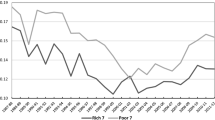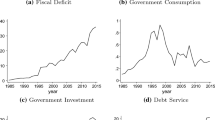Abstract
This paper aims at testing whether there exist spending interactions between French municipalities by estimating a dynamic panel data model. Our results suggest that there are some interactions between neighbouring municipalities as regards primary and investment expenditures. A positive relationship between municipalities’ wage bill and unemployment rates is likely to stress a rise of temporary employment in those municipalities that suffer from social troubles. Further, the estimation results show that these interdependences also exist between cities whose mayors have the same partisan affiliation. Finally, our results confirm the opportunistic behaviour of local governments, which increase all categories of public spending in pre-electoral periods
Similar content being viewed by others
References
Altshuler, A., & Goodspeed, T. (2002). Follow the leader? Evidence on European and U.S. tax competition. Departmental. Working Papers 200226, Rutgers University, Department of Economics.
Anselin, L. (1988). Spatial econometrics: methods and models. Dordrecht: Kluwer.
Anselin, L., Bera, A. K., Florax, R., & Yoon, M. J. (1996). Simple diagnostic tests for spatial dependence. Regional Science and Urban Economics, 26, 77–104.
Anselin, L., Le Gallo, J., & Jayet, H. (2007). Spatial econometrics and panel data models. In L. Matyas & P. Sevestre (Eds.), Handbook of panel data econometrics. Dordrecht: Kluwer.
Arellano, M., & Bond, S. R. (1991). Some tests of specification for panel data: Monte Carlo evidence and an application to employment equation. Review of Economic Studies, 58, 277–297.
Arellano, M., & Bover, O. (1995). Another look at the instrumental variable estimation of error-components models. Journal of Econometrics, 68, 29–52.
Auberger, A., & Dubois, E. (2005). The influence of local and national economic conditions on French legislative elections. Public Choice, 125(3–4), 363–383.
Baicker, K. (2001). The spillover effects of state spending. NBER Working Paper 8383.
Bhattacharyya, D. K., & Wassmer, R. W. (1995). Fiscal dynamics of local elected officials. Public Choice, 83, 221–249.
Besley, T., & Case, A. (1995a). Incumbent behaviour: vote seeking, tax setting and yardstick competition. American Economic Review, 85(1), 25–45.
Besley, T., & Case, A. (1995b). Does electoral accountability affect economic policy choices? Evidence from gubernatorial term limits. Quarterly Journal of Economics, 150, 769–798.
Besley, T., & Case, A. (2003). Political institutions and policy choices: evidence from the United States. Journal of Economic Literature, 41(1), 7–73.
Besley, T., Griffith, R., & Klemm, A. (2001). Empirical evidence on fiscal interdependence in OECD countries. Unpublished Manuscript. London School of Economics.
Binet, M. E., & Pentecote, J. S. (2004). Tax degression and the political budget cycle in French municipalities. Applied Economics Letters, 11, 905–908.
Blundell, R. W., & Bond, S. R. (1998). Initial conditions and moment restrictions in dynamic panel data models. Journal of Econometrics, 87, 115–143.
Blais, A., & Nadeau, R. (1992). The electoral budget cycle. Public Choice, 74, 389–403.
Bordignon, M., Cerniglia, F., & Revelli, F. (2003). In search of yardstick competition: a spatial analysis of Italian municipality property tax setting. Journal of Urban Economics, 54, 199–217.
Brett, C., & Pinske, J. (2000). The determinants of municipal tax rates in British Columbia. Canadian Journal of Economics, 33, 695–714.
Brueckner, J. K. (1998). Testing for strategic interaction among local governments: the case of growth controls. Journal of Urban Economics, 44, 438–467.
Brueckner, J. K. (2003). Strategic interaction among governments: an overview of empirical studies. International Regional Science Review, 26, 175–188.
Brueckner, J. K., & Saavedra, L. (2001). Do local governments engage in strategic property-tax competition? National Tax Journal, 54, 203–229.
Buettner, T. (2001). Local business taxation and competition for capital: the choice of the tax rate. Regional Science and Urban Economics, 31, 215–245.
Case, A. C., Rosen, H. S., & Hines, J. R. (1993). Budget spillovers and fiscal policy interdependence: evidence from the states. Journal of Public Economics, 52, 285–307.
Charlot, S., & Paty, S. (2007). Market access effect and local tax setting: evidence from a French panel data. Journal of Economic Geography, 7(3).
Coelho, C., Veiga, F. J., & Veiga, L. (2006). Political business cycles in local employment: evidence from Portugal. Economics Letters, 93, 82–87.
Devereux, M. P., Lockwood, B., & Redoano, M. (2002). Do countries compete over corporate tax rates? CEPR Discussion Papers 3400.
Drazen, A., & Eslava, M. (2003). Electoral manipulation via expenditure composition: theory and evidence. NBER Working Paper 11985, 35 p.
Dreher, A. (2006). The influence of globalization on taxes and social policy: an empirical analysis for OECD countries. European Journal of Political Economy, 22, 179–201.
Feld, L. P., Josselin, J. M., & Rocaboy, Y. (2002). Le mimétisme fiscal: une application aux régions françaises. Economie et Prévision, 156(5), 43–49.
Feld, L. P., & Reulier, E. (2005). Strategic tax competition in Switzerland: evidence from a panel of the Swiss cantons. CESifo Working Paper 1516, August 2005.
Figlio, D. N., Kolpin, V. W., & Reid, W. E. (1999). Do States play welfare games? Journal of Urban Economics, 46, 437–454.
Galli, E., & Rossi, S. (2002). Political budget cycles: the case of the Western German Länder. Public Choice, 110, 283–303.
Heyndels, B., & Vuchelen, J. (1998). Tax mimicking among Belgian municipalities. National Tax Journal, 51, 89–101.
Kelejian, H. H., & Prucha, I. (1998). A generalized spatial two stage least squaresprocedures for estimating a spatial autoregressive model with autoregressive disturbances. Journal of Real Estate Finance and Economics, 17, 99–121.
Kelejian, H. H., & Robinson, D. P. (1993). A suggested method of estimation for spatial interdependent models with autocorrelated errors, and an application to a county expenditure model. Papers in Regional Science, 72, 297–312.
Kneebone, R., & McKenzie, K. (2001). Electoral and partisan cycles in fiscal policy: an examination of Canadian provinces. International Tax and Public Finance, 8, 753–774.
Ladd, H. (1992). Mimicking of local tax burdens among neighbouring counties. Public Finance Quaterly, 20, 450–467.
Leprince, M., Madiès, T., & Paty, S. (2007). Business tax interactions among local governments: an empirical analysis of local tax setting in France. Journal of Regional Science, 47(3), 603–621.
Petterson-Lidbom, P. (2001). An empirical investigation of the strategic use of debt. Journal of Political Economy, 109(3), 570–583.
Redoano, M. (2003). Fiscal interactions among European countries. Warwick Economic research papers No. 680.
Redoano, M. (2007). Fiscal interactions among European countries. Does the EU matter? CESIFO Working paper No. 1952, March.
Revelli, F. (2001). Spatial patterns in local taxation: tax mimicking or error mimicking? Applied Economics, 33, 1101–107.
Revelli, F. (2003). Reaction or interaction? Spatial process identification in multi-tiered government structures. Journal of Urban Economics, 53(1), 29–53.
Rosenberg, J. (1992). Rationality and the political business cycle: the case of local government. Public Choice, 73, 71–81.
Saavedra, L. (2000). A model of welfare competition with evidence from AFDC. Journal of Urban Economics, 47, 248–279.
Salmon, P. (1987). Decentralization as an incentive scheme. Oxford Review of Economic Policy, 3, 24–43.
Shughart, W. F., & Tollison, R. D. (1991). Fiscal federalism and the Laffer curve. Economia Delle Scelte Pubbliche, 9, 21–28.
Solé-Ollé, A. (2003). Electoral accountability and tax mimicking: the effects of electoral margins, coalition government, and ideology. European Journal of Political Economy, 19(4), 685–713.
Strate, J., Wolman, H., & Melchior, A. (1993). Are there election-driven tax-and-expenditure cycles for urban governments? Urban Affairs Quarterly, 28, 462–479.
Veiga, L. G., & Veiga, F. J. (2007). Political business cycles at the municipal level. Public Choice, 131(1–2), 45–64.
Wilson, J. D. (1999). Theories of tax competition. National Tax Journal, 52, 269–304.
Author information
Authors and Affiliations
Corresponding author
Rights and permissions
About this article
Cite this article
Foucault, M., Madies, T. & Paty, S. Public spending interactions and local politics. Empirical evidence from French municipalities. Public Choice 137, 57–80 (2008). https://doi.org/10.1007/s11127-008-9312-z
Received:
Accepted:
Published:
Issue Date:
DOI: https://doi.org/10.1007/s11127-008-9312-z




